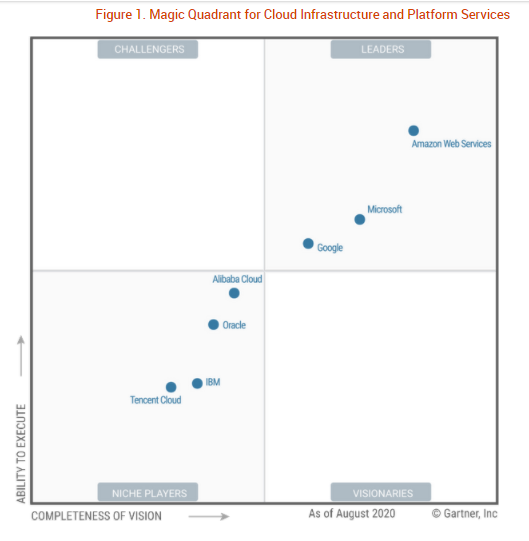The Overwhelming Importance of Cloud Technology

As a long-time subscriber to the British news magazine The Economist, I've learned to appreciate and rely upon its more globalist take on things, including technology. Thus, I was forcibly struck by its recent story from the February 27-March 5 edition titled "Collusion and collisions."
The story talks about how the Big 5 U.S. technology companies, also known as FAMGA — Facebook, Amazon, Microsoft, Google, and Apple — are increasingly growing marketshare by poaching on each other's turf and, simultaneously, looking for more ways to collaborate and cooperate. This is what Ray Noorda, the now-departed CEO of Novell, used to delight in calling "coopetition."
Chief among the money-making activities covered in this story is cloud computing, which the publication lists as one of 11 key technology areas in which these five giants and other global players compete and cooperate. This got me to thinking, not for the first (or the last) time, that cloud smarts are essential for most if not all IT professionals nowadays.
Let's look at what's going on in the cloud space, shall we?
Who's Tops in the Cloud World?
On Jan. 11, Larry Dignan at ZDNet published a story on "Top cloud providers in 2021." He not only lists them out, but he also provides a nice Gartner chart to show where they fit into the grand scheme of things from an Infrastructure as a Service (IAAS) perspective. Let's have a look:

Source: ZDNet
Counting down from top dog to paltriest pooch, here's who shows up in this diagram:
1) Amazon Web Services (AWS)
2) Microsoft Azure
3) Google Cloud Platform
4) Alibaba Cloud
5) Oracle
6) IBM
7) Tencent Cloud
Please note: at least six of these seven platforms have associated certification programs. I can't find one for Tencent Cloud, but everybody else on the list offers one or more certifications as part of a deliberate and conscious effort to support its cloud technologies with training and certification for IT professionals who work within their cloud platforms, tools, and APIs.
Some of those programs — including AWS, Microsoft Azure, Google Cloud Platform, Oracle, and IBM — are pretty comprehensive and elaborate. Most include administrator, architect and specialist credentials (in areas of software development, security operations, and so forth).
Moreover, all of them represent great opportunities for IT professionals to grow and secure their careers and career trajectories for the foreseeable future.
Just the Tip of the Iceberg

The foregoing list covers cloud computing platforms. Perforce it also points to vendor-specific training and certification programs. There are hundreds of other companies in the "cloud biz," many of which have their own certification programs.
This is likewise true on the vendor-neutral training and certification side of things cloud-related as well. Looking at vendor-neutral sponsors for cloud-related certifications, the following organizations command attention as leaders in that field:
CompTIA: Two cloud-focused credentials, Cloud Essentials+ and Cloud+
(ISC)2: Certified Cloud Security Professional (CCSP)
Cloud Security Alliance: Cloud Security (CCSK) and Cloud Auditing (CCAK) certificates
Arcitura: Eight certifications with "Cloud" in their designations, among 42 total cert offerings
Cloud Credential Council: Six total cloud-related certs (two foundational, four professional)
There's Gold in Them Thar Clouds!

I've observed for the past two or three years that the preponderance of Azure certifications at Microsoft shows a) how important Azure really is to the company, and b) that cloud drives business thinking and priorities. This is true at many more companies than Microsoft.
It's also true that some kind of hybrid multi-cloud architecture is in use at most companies today from the smallest mom-n-pop shops to the biggest and baddest of enterprises and governments. There's simply no avoiding the cloud, especially for those who work in IT.
This is an opportunity for interesting, top-salaried work in the near term and for as far out as I can see the technology landscape stretch. Jump aboard, dear readers, or be left behind. Not much of a choice, really.
Choice comes into play when you pick the cloud platforms you'll tackle and the kinds of tools, technologies and responsibilities you'd like to assume. That's when things get really interesting ...





